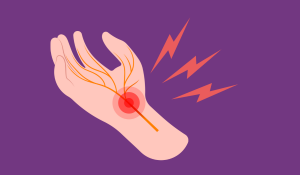Snoring is caused by air vibrating in the throat during sleep. It is common, and in many cases, not a problem. However, certain signs — interrupted breathing, headaches upon waking, sleeping poorly — can mean that snoring is a problem. Lifestyle interventions are an effective treatment for snoring, and more intensive treatments — like sleep apnea masks — can help as well. The evidence of CBD’s effect on snoring is mixed.
Snoring is a sound that some people make during sleep, as air vibrates relaxed tissues in the throat. Mild snoring is often not a problem, but extreme snoring can be irritating for a sleep partner, and even indicate underlying problems.
Snoring is common and in most cases not a cause for concern. However, certain patterns of snoring can indicate an underlying problem, including sleep apnea — a condition characterized by interrupted breathing during sleep.
Signs of a deeper problem include the following:
A number of factors can lead an individual to snore, including the following:
As noted, in many cases snoring requires no treatment. In other cases, modest lifestyle adjustments — like not drinking alcohol before bed, or losing weight — can notably reduce snoring.
However, snoring should be addressed by a professional if associated with the above problems, like sleep apnea — or if it is notably interrupting sleep or a partner’s sleep.
More intensive treatments may involve sleep appliances, including a “continuous positive airway pressure” mask for sleep apnea. In significant cases, surgery on the upper part of the airway can allow air to flow more smoothly, and consequently decrease snoring.
There is limited evidence of the direct effect of CBD on snoring. One study supported the use of CBD for anxiety disorders, but was more mixed on its role in sleep. However, another study in rats suggested beneficial effects of CBD on sleep, including decreasing REM sleep (which may have an effect on snoring).
Ultimately, more research is needed to fully determine if CBD can effectively treat snoring.

Explore this cbd consumption methods tutorial and follow the step-by-step process to select, use, and verify the safest ways to consume CBD for wellness.
Read More
Learn what CBD edibles are, their main types, expected effects, legal status, safety factors, and how they compare to other forms of CBD.
Read More
Therapeutic Uses of CBD Managing Chronic Pain with CBD Struggling with chronic pain? CBD might help. Studies suggest it can reduce inflammation and alleviate discomfort,...
Read More
Just as CBD may help humans due to its interaction with the body’s endocannabinoid system, the same is true of dogs. CBD has the potential...
Read More
Cannabis has been used for millennia to treat numerous health conditions. Current research offers promising results on the effects of CBD oil on breast cancer.
Read More
What Is CBD for Cats? CBD (Cannabidiol) is a natural compound from hemp. It’s non-psychoactive, meaning your cat won’t get “high.” Instead, it works with...
Read More
1. Understanding Neuropathic Pain Neuropathic pain results from nerve damage or dysfunction, causing symptoms like burning, tingling, or sharp shooting pains. Common Causes: Symptoms Include:...
Read More
CBD for Pets: A Pet Parent’s Guide to Dosage We all want the best for our pets, especially when they’re struggling with pain, anxiety, or...
Read More
What Is Lupus? Lupus is a long-term autoimmune condition that can impact multiple organs, including the skin, heart, lungs, and kidneys. The most common type...
Read More
1. Full-Spectrum CBD: The All-In-One Option What it is: Contains CBD, minor cannabinoids, terpenes, flavonoids — and less than 0.3% THC. Why choose it: Promotes...
Read More